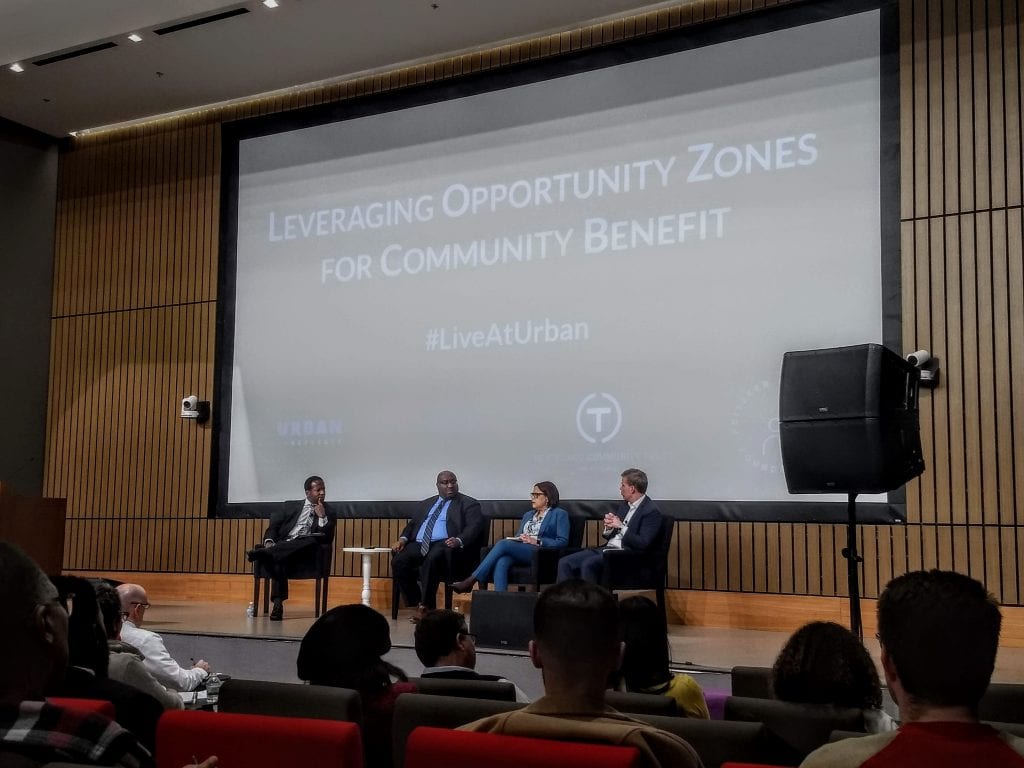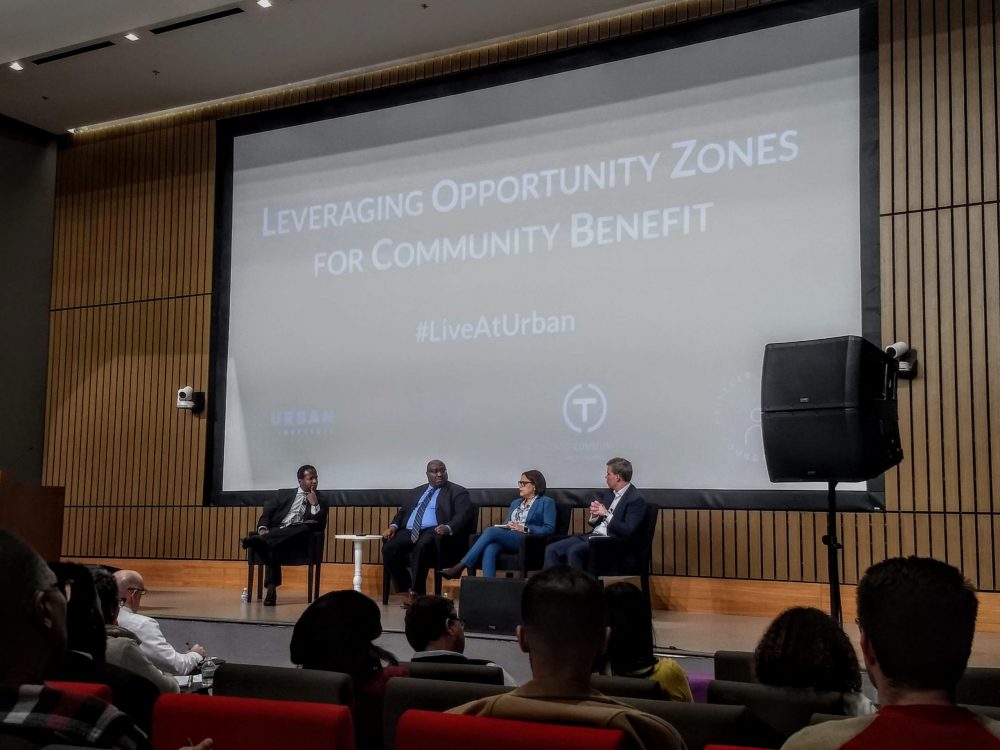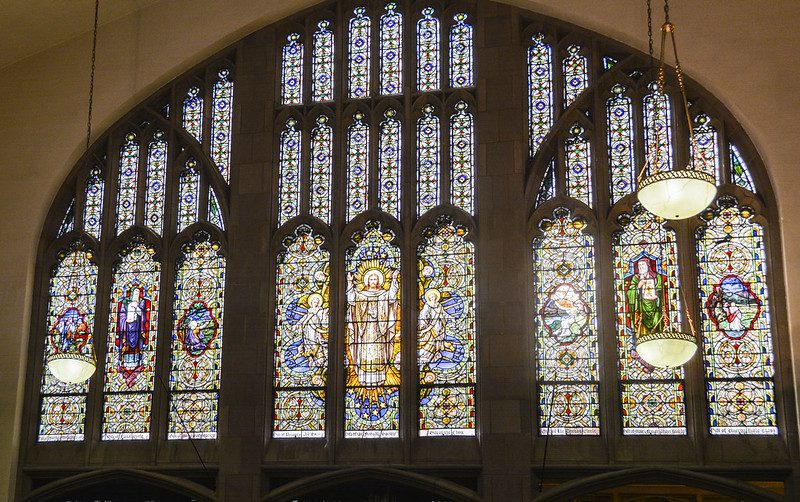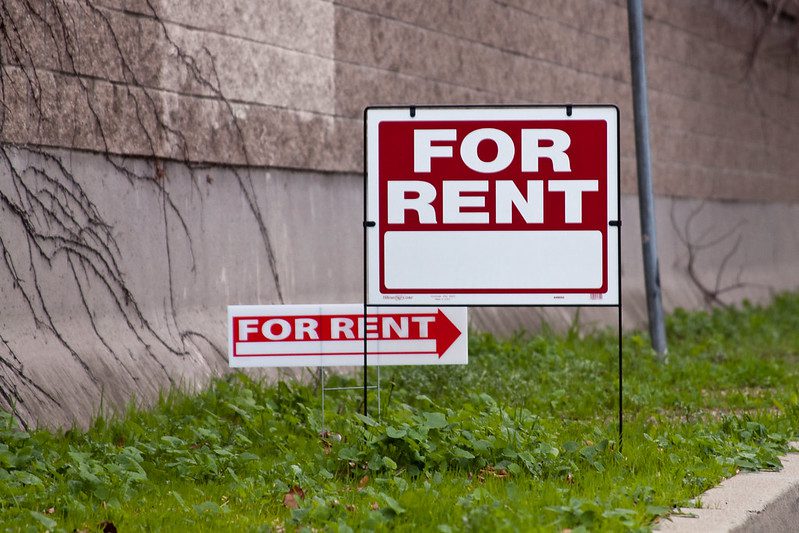
During a panel discussion, Derek Douglas, Bo Kemp, O. Victoria Lakes-Battle, and Matt Reilein talk about how Opportunity Zones can build community wealth. Photo by Tanner Howard
For the large crowd gathered at Malcolm X College in Chicago’s West Loop on Jan. 17, a distinct sense of opportunity pervaded the conversation. In “Leveraging Opportunity Zones for Community Benefit,” a set of talks convened by the Urban Institute to discuss Opportunity Zones, participants agreed that the measures would bring sorely needed private investment to low-income communities on Chicago’s South and West sides. But with high hopes came a clear sense that stakeholders needed to move quickly to take advantage of the window for investment, a challenge since the government shutdown had prevented the IRS from formally releasing important clarifications about the project. With more than 8,700 census tracts designated as Opportunity Zones nationwide, the competition to receive funding from potential investors was a major focus of the conversation.
The participating panelists, who mostly represented various community finance groups based in Chicago, all agreed on the need for quick action and a clearer sense of the regulatory environment surrounding potential investments. And while Opportunity Zones (or “O Zones,” as they were frequently referred to in the discussion) have been promoted to investors as a unique opportunity to avoid taxation on capital gains by investing in housing and business development in communities historically deprived of financial support, the question of who would benefit most from these investments marked a clear division between participants. As Laurel Blatchford wrote in Shelterforce last May: “The potential is there for great benefits, but it is not yet clear where, how, and to whom any benefits will accrue.” These questions hung in the air at the end of the discussion, even as there remained little consensus on how the initiative would actually impact the communities it targeted.
“Is it good? Is it bad? Is it a boondoggle? Or is it really an opportunity to address some of the needs of communities in Opportunity Zones?” asked Sarah Rosen Wartrell, president of the Urban Institute, while introducing the conversation.
Some census tracts chosen for O Zones, including high-cost cities like Seattle and Oakland, are already undergoing gentrification and will undoubtedly see new investment in the next several years. But the census tracts chosen for Opportunity Zone investment in Chicago represent some of the city’s most financially disinvested. According to the city’s website, the 133 tracts chosen have unemployment rates at 20 percent or higher, a median family income of $38,000 or less (about 50 percent of Area Median Income), and a poverty rate of 30 percent or more, making the potential impact of any new capital investments substantial, if effectively implemented.
The lure of Opportunity Zone investment has already pushed several Chicago area groups to raise large sums of capital for potential investment, including one firm that crowdfunded $105 million from 425 investors in less than a day. But with the neighborhoods chosen representing some of the city’s poorest, there are factors like institutional racism, inequitable distribution of public goods, and a public perception of crime and violence that have clung to Chicago and complicate the success of any potential investments. As University of Illinois-Chicago Urban Planning professor Rachel Weber told Crain’s Chicago Business, “[The program] just treats poverty like a real estate problem. I think everybody knows it’s a little bit more complicated than that.”
In the first discussion, “How Can Opportunity Zones Advance the Development and Preservation of Affordable Housing?” panelists looked at the potential for O Zone investment to fund affordable housing development. Though the participants acknowledged that O Zone investment was targeted at business development, the significant availability of currently unsubsidized and unprotected affordable housing in these communities makes affordable housing preservation a potential focus for investors. Panelists argued that housing preservation could be a critical way of benefitting long-term residents in these communities, ensuring greater safety and neighborhood vibrancy while boosting home values for those who may have lived in the community for decades.
The first panel also raised concerns about the ongoing lack of clarity from the government about how Opportunity Zone investment will work in practice. While the 35-day government shutdown had prevented the IRS from finalizing several important guidelines surrounding potential investments, there was a clear sense that even once the shutdown was over, the federal regulations remain limited in their ability to promote oversight and accountability once O Zone investment begins in earnest.
Panelists agreed that the Illinois state government should introduce its own set of “guiderails” to assure investors and promote accountability, though it remained unclear how that would actually occur. Because the federal regulations require no disclosure of who, how, or why investors are involved in O Zone projects, panelists raised concerns about potential bad actors (including wealthy celebrities looking to increase their wealth, like Myspace founder Sean Parker) entering the field, taking advantage of the proposed financial incentives without concern for the needs of the community. “It’s a tough question, especially given the fact that this is just a provision in the tax code that anybody can access,” said one panelist. “I think it speaks to the importance of communities being engaged and prepared with the plans that they want to see happen in their community.
Concerns about oversight bled into conversations around equity, and the purpose of the O Zone initiative in the first place. During the second panel discussion, “How Can Opportunity Zones Build Community Wealth?” disagreement emerged. Matt Reilein, a partner and managing director at Cresset Partners, a Chicago-based private investment firm, asserted that investors would only get involved in O Zone projects if they were guaranteed a substantial profit in the next decade. O. Victoria Lakes-Battle, executive director of IFF, a Chicago-based community development financial institution, pushed back, challenging Reilein and the audience to consider the actual purpose of the new legislation.
“We’re talking largely about Black and brown people, the perception of them, and I think that’s why we’re here,” said Lakes-Battle. “As we evaluate, I want to suggest something we might consider, because I do not feel like it’s appropriate to have a financial dialogue about investing in Black and brown communities without having what I think is the capital-E Equity dialogue.”
Throughout the rest of the discussion, Lakes-Battle returned to these questions, marking a clear shift in emphasis in a conversation that had been focused on what would draw investors into particular O Zone projects. One of the biggest challenges, she said, was the potential disconnect between investors and those in disinvested communities seeking financing.
“When we get into community development, we’re often evaluating the capacity of an individual or organization on the basis of their ability to understand my language,” Lakes-Battle said. “The community has to articulate its value in the context of concepts that are foreign, and we haven’t taken the time to break things down and make it plain. It’s not rocket science, but it’s also not digestible.”
Whether that idea made it to conversations between investors and potential O Zone project leaders following the panels was unclear. But in closing remarks, Helene Gayle, president and CEO of the Chicago Community Trust, reminded participants of the stakes in their participation in the gathering, one that may reshape large swaths of the city for decades to come.
“Time is slipping away, and this is a time-limited opportunity in some ways,” Gayle said. “There’s a real opportunity here, and my main plea coming out of this is that we get some things done, that we don’t let the perfect be the enemy of the good.”






Pls do not conflate “Opportunity Zones” with “economic development”; these are two different concepts. An investment deal is a business deal; this is private-sector focused under the guise of a public initiative. True economic development directly addresses standards of living & quality of life outcomes, in real terms; that’s the bottom line. Sadly, economic development is still measured in business terms, rather than in socioeconomic terms. As such, cities & other areas who say they are doing “economic development” are actually only doing business development — if you want to promote & support business development, join the Chamber of Commerce, as this is their mission in life. The mission of public actors using public resources is another kettle of fish. Let’s finally graduate to another level of understanding & action.
First of all, Lakes-Battle says it all in a larger sense…where are the representatives from the Brown community? I mean the Mexican Americans, Puerto Ricans, Cuban Americans, Dominicans, etc.? Why just investors and the Blacks and not all people of color? Shouldn’t all be included as well? This is a continuing problem that must be remedied.